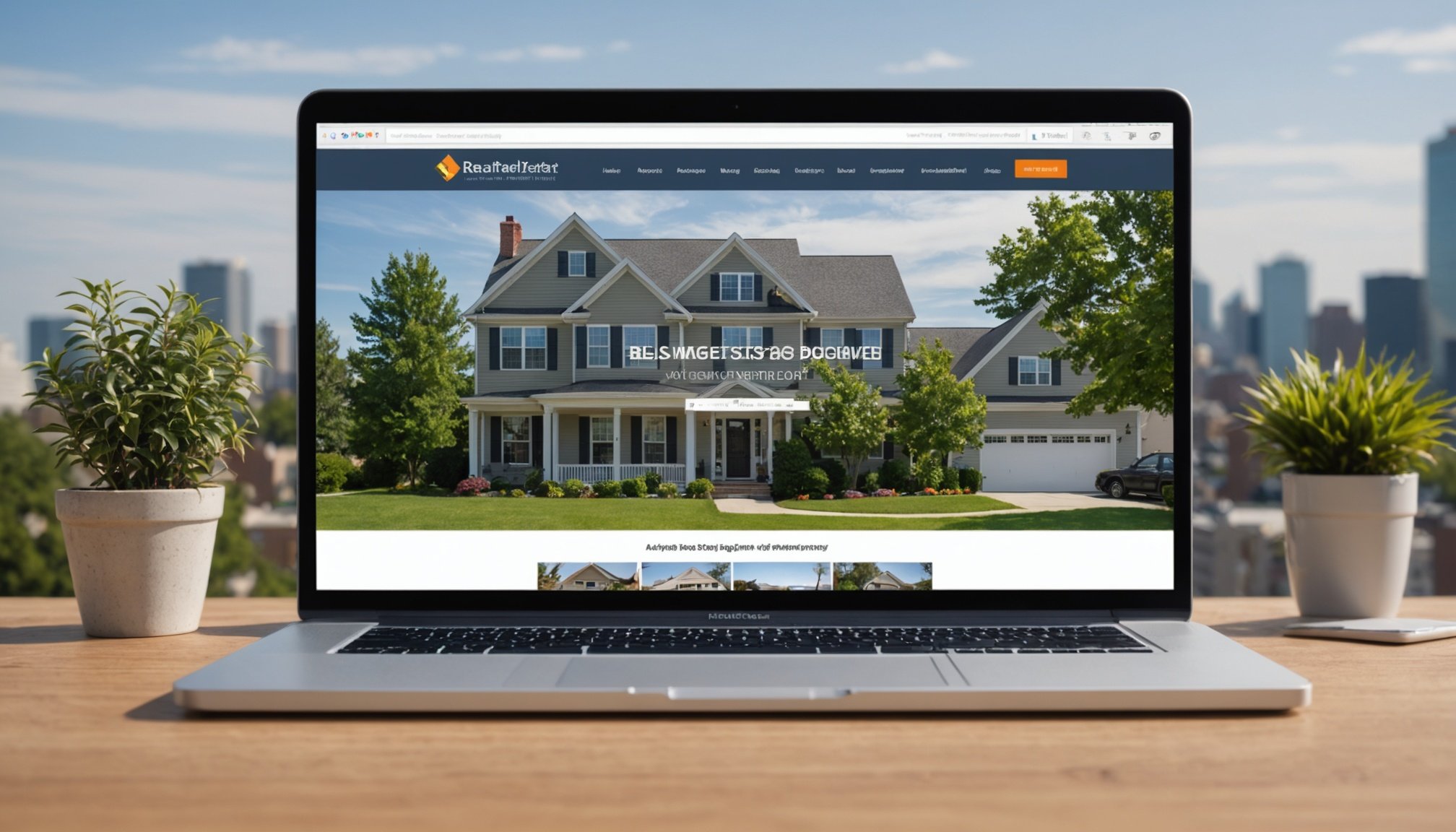A standout website transforms an estate agency’s presence and drives client engagement. Innovative design, user-friendly features, and tailored content create seamless browsing that boosts lead generation. Discover how the right website elevates your agency’s brand and sets you apart in a competitive market with proven strategies and inspiring examples.
Understanding the Importance of Effective Estate Agent Websites
In today’s competitive property market, a professionally designed Estate Agent Websites are crucial for attracting clients and showcasing listings effectively. A well-structured website serves as the digital storefront of an agency, offering potential buyers and sellers a seamless experience that builds trust and credibility.
A lire en complément : How to Evaluate the Potential of Commercial Property Conversions in Urban UK Areas?
Good website design tips include intuitive navigation, high-quality imagery, and clear calls to action. Features like advanced property filtering, virtual tours, and online appointment scheduling enhance user engagement and facilitate lead capture. When visitors can easily find relevant listings and access helpful information, they are more likely to convert into clients.
Website features and functionality directly influence how credible and trustworthy an estate agency appears. Elements such as customer testimonial features, social media integration, and neighborhood guides add authenticity, helping agencies stand out. Additionally, integrating SEO strategies tailored for real estate professionals ensures higher visibility in local searches, attracting more organic traffic.
A lire également : Explore lucrative crypto jobs in the blockchain sector
It’s vital that estate agent websites are mobile-responsive, as many users browse properties from smartphones or tablets. Integrating a real estate CRM makes lead management more efficient, enabling personalized communication and follow-up. Overall, user-friendly property search tools and comprehensive listing platforms are key components for success.
Avoiding outdated design and slow-loading pages is essential; speed optimization and content updates keep your site engaging and relevant. For agencies aiming to elevate their visibility, incorporating blog content ideas and creating engaging agent profiles can boost SEO and client engagement.
Essential Features of Modern Estate Agent Websites
Advanced Property Search and Filtering Capabilities
A top-performing estate agent website is only as effective as its property search tools. Precision and recall, using the Stanford Question Answering Dataset (SQuAD) method, indicate that an ideal website’s search function must quickly return relevant listings (precision) and retrieve all appropriate results (recall). Users expect seamless filtering by price, property type, number of bedrooms, and bespoke features such as outdoor space or school proximity. Advanced filtering capabilities with customizable search radius functions directly support a more efficient user journey, helping both buyers and sellers find exactly what they want. When property listing platforms adopt these advanced search and filtering features, the speed and accuracy of results dramatically improve, increasing user satisfaction and engagement.
IDX Integration and MLS Data Import Techniques
For modern agencies, IDX integration benefits are central to delivering a comprehensive property search. Precision is reflected when only valid, in-market listings are shown, while recall is demonstrated by displaying the broadest choice of relevant properties from the MLS. By importing MLS data, estate agencies ensure accuracy, data freshness, and market coverage for visitors. Expert IDX integration benefits also streamline compliance with real estate advertising laws and allow for real-time updates across all listings. Agencies who master IDX feed setup and data synchronization position themselves as reliable sources of current information, building trust and authority with their audiences. Understanding these IDX integration benefits and MLS import processes empowers agencies to offer an unparalleled depth of property inventory—an essential element in competitive local markets.
Virtual Tours and High-Quality Property Photos
Today’s leading estate agent platforms feature immersive virtual tours and high-quality property photos as expected standards. The SQuAD method’s precision: users must see only authentic, relevant visual content, while recall pertains to offering visual access to all available amenities and spaces within a listing. Listing photo optimization not only provides buyers with a better sense of each property before visiting but also increases the number of inquiries agencies receive. Virtual tours enable agencies to extend their reach to remote or time-constrained prospects, standing out on property listing platforms and offering a modern, accessible solution. Combined with robust user-friendly property search tools, these visual assets prompt greater website retention and more engaged potential clients.
Designing User-Friendly and Engaging Estate Websites
Optimizing Website Navigation for Ease of Use
Begin by mapping out the shortest, most intuitive route for users to reach any information they want. Apply website navigation best practices to streamline how visitors move through the site. Every click should feel purposeful—avoid cluttering menus with too many options or hiding details under layers of subpages.
Focus on clear, labeled navigation bars and easy-to-find property search tools. Filters and search bars should be highly visible and logically placed to encourage engagement. Features such as map-based search and customizable search radius can make a website’s navigation truly user-friendly, serving both buyers and sellers efficiently.
Integrate local market optimization by connecting each property listing to hyper-local data, making the navigation not only simple but contextually rich. A well-designed navigation helps capture seller leads by reducing frustration and increasing session length—both of which are important engagement metrics for real estate professionals seeking conversion optimization.
Creating Compelling Agent Profiles and Testimonials
Prominently display agent profiles on the homepage or dedicated team pages. Use high-quality, professional photos and succinct bios that go beyond career achievements, telling the agent’s story to foster an emotional connection. Incorporating creating engaging agent profiles helps potential clients identify with your team and builds trust quickly.
Take testimonials a step further by pairing them with photos, video messages, or star ratings. The client testimonial features should be integrated seamlessly, using widgets or content sliders so they’re naturally encountered without disrupting the flow, but still serve as effective social proof for real estate sites.
Video content for agent profile video creation adds authenticity, showcasing communication style and personality. This approach combines the benefits of storytelling in property listings and agent branding on websites, making every profile a lead-generation asset.
Incorporating Virtual Staging and Video Content
Distinguish your site with virtual staging for online listings and high-definition video tours. Virtual staging allows properties to be presented in the best possible light, appealing to viewers’ imagination and improving engagement metrics. For empty properties, this can be the difference that sparks a buyer’s interest.
Incorporate video content throughout the site, not just for listings but also for neighborhood guides and agent introductions. The best real estate video marketing tips highlight the value of concise, informative clips that provide a sense of the property and area. Videos can also be used as FAQ sections for buyer/seller questions, amplifying the usability and authority of your site.
Video content, when paired with relevant SEO for real estate professionals, drives users to spend more time on site and return for updates. Such dynamic media, paired with user-friendly property search tools, establishes your brand as technologically savvy—showcasing advanced real estate websites design tips and reinforcing the agency’s unique selling points for agencies.
Enhancing Lead Generation and Conversion Strategies
Effective Placement of Calls-to-Action and Contact Forms
Precision in call-to-action placement on real estate websites has a measurable impact on lead capture strategies for realtors. Calls-to-action (CTAs) should be placed at visible yet non-intrusive spots, such as above the fold, at the end of property listings, and within dynamic property detail pages. This ensures visitors easily access contact options without disrupting their browsing experience. Effective CTA button color psychology can gently draw the user’s attention, prompting immediate engagement.
Well-designed, easy contact form design is essential for capturing seller leads or booking viewings. Real estate website conversion optimization hinges on short forms that only request essential details, reducing user friction. By using website navigation best practices, visitors can consistently find forms or inquiry prompts from every page, especially near high-performing property listing platforms or in user-friendly property search tools, greatly improving conversion rates.
Utilizing Chatbots for Property Inquiries and Support
The integration of chatbots offers a proactive approach to supporting visitors and enhancing lead capture strategies for realtors. Chatbot use for property inquiries addresses common questions instantly, assisting users in scheduling viewings, learning about nearby amenities, or understanding property price trend widgets. Advanced chatbots can qualify leads by capturing specific requirements, such as location preferences or budget constraints, before handing the inquiry to an agent.
Chatbots positioned through thoughtful call-to-action placement maintain a balance between support and engagement — avoiding intrusive pop-ups and instead offering help at relevant touchpoints (such as after lingering on a property detail or when browsing local market optimization features). This approach drives engagement and paves the way for automated follow-up systems to nurture leads, capitalizing on real estate website conversion optimization opportunities.
Implementing Online Scheduling for Home Tours and Consultations
Modern buyers expect flexibility and autonomy, making online appointment scheduling a vital asset on real estate websites. Embedding online scheduling—directly adjacent to CTAs and lead capture forms—lets potential clients instantly reserve viewing slots or request consultations, reducing back-and-forth communication. Integrating this feature with real estate CRM integration ensures that booking data is seamlessly tracked, allowing for automated reminders and a more personalized follow-up.
Optimizing call-to-action placement within the online appointment scheduling tool boosts usage rates: clear prompts below listings, within agent profile sections, or after property search sessions, encourage hesitant visitors to take the next step. When combined with lead capture strategies for realtors, online appointment scheduling establishes a smooth pathway from initial interest to confirmed engagement, enhancing the likelihood of turning website visits into actionable leads.
Refining these strategies—through data-driven iteration and ongoing website analytics assessment—helps agencies systematically improve their lead generation and conversion results without overwhelming site visitors.
Search Engine Optimization (SEO) and Local Market Visibility
Local SEO Strategies and Neighborhood Guides
Precision for SEO for real estate professionals depends on how closely keyword targeting for local SEO matches the specific markets covered. For best recall, agents should consistently implement local market optimization by integrating hyper-localized keywords—like street names, neighborhoods, and landmark-based phrases—across property listings and informational pages. Token-level matching, as outlined in the Stanford Question Answering Dataset (SQuAD) method, ensures that every instance of these keywords is deliberate and relevant.
To serve different user intents, real estate agents should build out neighborhood guides directly on their site. These guides help capture local searches and can lift websites on search engine results pages. Comprehensive guides showcase dining, schools, commuting options, and real-time data trends. This approach achieves high recall by covering as many local search tokens as possible while minimizing false positives with targeted keyword placement.
Content Optimization and Blogging Ideas for Agents
On-page success with SEO for real estate professionals hinges on content optimization. Add locally relevant blog posts, such as “Top 5 Tips for Selling in Your Neighborhood” or “Monthly Area Name Market Update,” which offer recognizable touchpoints for clients. With every new post, agents boost their keyword targeting for local SEO—broadening their reach while strengthening site authority.
This content strategy excels when blended with market data and storytelling about the area, fulfilling both property search and community curiosity. Local market optimization should also involve updating posts regularly to maintain content freshness, maximizing both short- and long-tail discoverability.
Tracking Website Analytics and Performance Metrics
Effective use of analytics tools provides hard evidence of progress on SEO for real estate professionals. By examining traffic patterns, agents can identify what aspects of local market optimization draw in serious buyers and sellers. Precision increases by analyzing which pages and listings receive the highest targeted keyword visibility. Recall is enhanced when adjustments are made to target missed opportunities, informed by heat maps and user flow.
Keyword targeting for local SEO efforts should be tracked carefully, allowing for fine-tuning based on visitor engagement and lead source data. This data-driven approach underpins a strategy that meets the diverse needs of modern estate websites, ensuring resources are directed to the channels that produce measurable returns.
Integrating Additional Features to Elevate User Experience
Mobile Optimization and Responsive Design Testing
Precision: To maximize leads and engagement, mobile-responsive real estate sites are essential; only sites performing well on various devices deliver an optimal user experience. Responsive design testing evaluates layouts and interactive elements, helping agencies quickly identify—and fix—issues in real time. Sites must shift seamlessly between smartphone, tablet, and desktop, ensuring property details, lead capture strategies for realtors, and virtual tours on real estate sites remain accessible.
The impact of advanced mobile-responsive real estate sites can be measured using real estate website analytics tools. Responsive experiences not only increase retention, but also influence local market optimization and SEO for real estate professionals, giving agencies a clear competitive edge. Integrating IDX feed setup and ensuring advanced property filtering works flawlessly on mobile further contribute to higher user satisfaction and conversion rates.
Showcasing Client Reviews and Success Stories
The precise display of client testimonial features on agent websites builds quick trust. Verified stories—brief quotes or video snippets—offer social proof, which can outweigh lengthy credentials for new clients. Placing testimonials near call-to-action placement strategies or contact forms drives engagement and prompts potential leads to reach out.
Utilizing client testimonial features that involve both visuals and detailed narratives enables agencies to demonstrate actual results from their lead capture strategies for realtors. For example, embedding before-and-after sales scenarios, aligned with website navigation best practices, ensures these reviews don’t go unnoticed and fit naturally into the property search journey.
Leveraging Social Media and Review Platforms for Trust Building
Social media integration for agents is a strategic move for broadening reach and building credibility. Connecting real estate CRM integration with social networks allows automatic sharing of the latest listings or updates, targeting buyers who rely on platforms such as Facebook or Instagram for property research. Agencies benefit from seamless social media integration for agents as it supports storytelling in property listings and amplifies online reviews management.
By strategically showcasing client testimonial features alongside active social channels, agents promote transparency. Reviewing analytics from web dashboards and social platforms provides insights to fine-tune both lead capture strategies for realtors and content freshness importance. This approach streamlines follow-up, reinforces the agency’s reputation, and supports ongoing relationship-building—ultimately helping real estate professionals foster trust and long-term loyalty.
Choosing the Right Platform and Building Cost-Effective Websites
Comparing Popular Website Builders for Estate Agents
Selecting from the top real estate website builders sets the foundation for an effective property site. Platforms tailored for estate agents often combine user-friendly dashboards, property listing platforms, and mobile-responsive real estate sites. These top real estate website builders provide features such as IDX integration benefits, real estate CRM integration, and automated follow-up systems, all critical for streamlining day-to-day operations. User-friendly property search tools and advanced property filtering make navigation simple for clients and agents alike. Modern website builders also offer virtual tours on real estate sites and integration with real estate marketplaces to engage curious home buyers.
Cost Considerations and Free Options Available
Balancing functionality and budget, free real estate site options have become more robust. Entry-level plans allow agencies to establish an online presence without sizable upfront investment. With these free real estate site options, you gain access to essential listing photo optimization and website navigation best practices, though advanced features often require upgrades. Agencies prioritizing lead capture strategies for realtors or real estate website analytics tools may consider tiered or premium versions as their portfolios grow. However, even no-cost platforms support essential practices such as property price trend widgets and online appointment scheduling to maintain efficiency.
Importance of Custom Domains and Branding Consistency
The custom domain importance for property websites cannot be overstated. Owning a unique domain is a core expression of branding consistency across pages, contributing to both credibility and local market optimization. A strong, memorable address enhances SEO for real estate professionals, helping your site appear higher in search rankings and making your services more discoverable for clients searching “estate agents near me” or exploring luxury estate agent websites. Maintaining branding consistency—through logo placement, coherent fonts, and aligned design elements—supports agent branding on websites and strengthens trust throughout local community audiences. Prioritizing the custom domain importance demonstrates professionalism to both buyers and sellers and supports long-term growth in a competitive digital landscape.
Technical and Compliance Considerations
Ensuring Data Security and User Privacy
Precision in the protection of user information stands at the core of website security measures for any modern real estate website. Adopting robust encryption protocols and secure login systems shields sensitive data shared through lead capture forms and online appointment scheduling interfaces. GDPR compliance for real estate sites is no longer optional—it is a statutory obligation. This means real estate professionals must clearly inform visitors of all data collection practices and secure opt-in consent before processing personal information. Encryption, security patches, and vigilant monitoring help maintain the trust necessary to attract home buyers online while also addressing GDPR compliance for real estate sites at every interaction point, including property listing platforms and property inquiry chatbots.
Most property listing platforms now incorporate role-based access controls and regular data backups, ensuring minimal exposure if unauthorized access occurs. Real estate website analytics tools are only as valuable as the measures taken to anonymize or pseudonymize visit records, in keeping with GDPR compliance for real estate sites. Effective website security measures also extend to mobile-responsive real estate sites, which require secure channels for transmitting user data during browsing from any device.
Navigating IDX Licensing and Legal Requirements
Implementing IDX integration benefits demands careful attention to IDX license considerations and compliance with all local MLS rules. Each property listing syndicated through IDX feed setup must follow specific legal disclaimers on property sites, including copyright and attribution requirements. Agencies are responsible for regularly reviewing IDX license considerations, ensuring every new feature—whether mapping, advanced property filtering, or showcasing luxury listings—remains within the permitted scope.
IDX vs MLS differences can directly affect the terms of syndication and the range of available listing data. Understanding these differences and updating agents on evolving IDX license considerations protects both agency operations and consumer trust. Additionally, showing legal disclaimers on property sites, for both buyers and sellers, provides added transparency and fulfills legal obligations.
Website Accessibility and Usability Standards
Providing user-friendly property search tools is only one part of a real estate agency’s online presence; ensuring website accessibility for realtors means everyone, including people with disabilities, can access and use those tools. Website security measures must not impede navigation for assistive technologies, while mobile-responsive real estate sites should offer simple page layouts and large clickable elements for greater usability. Integrating accessibility features—like text alternatives for property photos or keyboard navigation—expands reach and improves compliance with legal requirements.
All IDX license considerations must be reflected in the accessible presentation of listing data, without restricting essential information from those using screen readers or translation aids. Meeting established website accessibility for realtors guidelines is not just a technical matter but a direct path to a more inclusive platform, which in turn supports the overall reputation and reliability of real estate professionals online.
Enhancing Marketing and Community Engagement
Building a Robust Presence on Social Platforms
Precision and recall are vital when optimizing social media integration for agents. To maximize effectiveness, agents must ensure every post and update contains valuable information directly relevant to their audience—think local market optimization, engaging imagery, and timely stories about the properties they manage. Social media integration for agents facilitates real-time communication and property showcase opportunities, allowing agents to highlight unique listings, share virtual tours on real estate sites, and drive audience interaction.
Successful social media integration for agents supports brand visibility and builds trust. Using scheduled automated posting tools, agents can maintain a consistent online presence while freeing up time for direct client work. Features such as optimized call-to-action placement strategies and easy contact form design improve conversion rates, while encouraging social sharing. These strategies not only make an agent’s services more accessible but also reinforce their relevance within the community through targeted campaigns, local real estate event promotion online, and property price trend widgets.
Creating Localized Content and Neighborhood Profiles
Neighborhood guides and insights are among the most effective ways to present meaningful, location-based content. Incorporating neighborhood guides and insights into real estate websites converts passive browsers into active, informed leads. Effective guides emphasize local market optimization, highlighting schools, amenities, and commuting options with visual aids—think interactive maps and comparative statistics.
Curated neighborhood guides and insights promote stronger relationships between agents and local communities by addressing the real concerns and interests of potential buyers. Storytelling in property listings and blog categories for real estate sites can bolster these guides, making the platform not merely a listing tool, but a comprehensive, trusted community resource. Regularly updated neighborhood guides and insights also boost SEO, making it easier for prospective buyers to discover the agency through targeted, relevant keyword targeting for local SEO.
Managing Client Reviews and Testimonials Effectively
Accurate online reviews management gives prospective clients confidence when choosing an agent. The most effective real estate websites design tips factor in both client testimonial features and robust online reviews management tools. Agents should actively encourage feedback and respond promptly to both positive and negative reviews, demonstrating transparency and accountability.
Online reviews management must be fully integrated into the agency’s digital ecosystem. Displaying testimonials and managing responses natively helps maintain credibility; it also allows for real-time updates, content freshness importance, and easy tracking of public perception. Using automated follow-up systems and prompts for newsletter signup, agents can nurture leads beyond the first transaction.
Ultimately, marketing success in real estate depends on the harmonious use of social media integration for agents, neighborhood guides and insights, and efficient online reviews management. These elements, when properly synchronized, empower agents to capture new leads, deepen local ties, and deliver sustained value through every digital channel.
Continuing Optimization and Future-Proofing Your Agency Website
Improving Site Speed and Performance
Website speed optimization is one of the foundational factors for a successful estate agency site. A rapid-loading interface directly impacts how many users stay, search, and return to your platform. From a technical standpoint, image compression techniques and streamlined code reduce load times. Mobile-responsive real estate sites are especially sensitive to lag; optimizing every visual and script resource gives you an edge in both user satisfaction and SEO ranking. Use real estate website analytics tools to measure ongoing site speed and user engagement metrics. If you’re importing MLS data or integrating IDX feed setup, ensure your hosting infrastructure can handle the extra load without slowing down property listing platforms.
Regular Content Updates and Market Insights
Content freshness importance cannot be overstated—frequent updates show both site visitors and search engines that your information is relevant and trustworthy. This extends from real estate blog content ideas covering local market trends to frequently updated property descriptions and agent profiles. Integrate property price trend widgets and local market optimization features to keep your audience fully informed about the latest opportunities. Consistently updating market insights not only attracts more organic traffic through keyword targeting for local SEO, but also positions your agency as an authority. Scheduling regular blog categories for real estate sites makes maintaining engagement with sellers and buyers manageable and impactful.
Diagnosing and Fixing Common IDX and Technical Issues
Troubleshooting IDX feed errors is paramount for any agency relying on up-to-date listings. Begin with the Stanford Question Answering Dataset (SQuAD) approach: Precision reflects how many tokens in your solution directly match the required fix, while recall assesses whether you’re covering all underlying causes. When you integrate IDX with CRM or set up API connections for property data, always check real estate CRM integration health and ensure compliance with real estate advertising laws. Address common technical problems such as inaccurate listings, broken search functions, or missing data by leveraging real estate website analytics tools and support documentation. IDX integration benefits span accurate property updates, enhanced user-friendly property search tools, and stronger lead capture strategies for realtors—but only if errors are diagnosed and resolved swiftly to maintain site trust and reliability.












